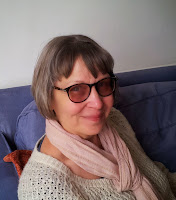Network News: North-East - Line by line by line by line editing with Sara Grant in York
Maureen Lynas
The lovely Sara Grant visited our NE group in York a couple of weeks ago to deliver a workshop on line by line editing. I’ve asked her if I can share just one of the brilliant exercises that shemade us do she had prepared.
The Verb Exercise
Pick a chapter, any chapter, don’t show me. Right. Now highlight your verbs.
There were mutters around the table of, ‘What’s a verb again?’
Well, you could say…
It’s any member of a class of words that function as the main elements of predicates, that typically express action, state, or a relation between two things, and that may be inflected for tense, aspect, voice, mood, and to show agreement with their subject or object.
Or you could say…
Any of a large class of words in a language that serve to indicate the occurrence or performance of an action, the existence of a state or condition, etc. In English, such words as run, make, do, and the like are verbs.
Or you could say…
It’s a doing word. It’s the key word in each sentence, the word that reveals what is happening.
Seems simple now? But perhaps it seems too simple.
We all merrily highlighted away in a swirl of many colours. We looked and spotted and crissed and crossed verbs like - looked and spotted and crissed and crossed.
Then, there were more mutters around the table of, ‘Is this one? Is this? What about this? I’m confused.’
A room full of authors, some published, some not, and we couldn’t seem to nail a clear definition of what a verb was. Hardly surprising when you see some of the definitions above. Dictionaries and grammar books seem to be written in a foreign language. To understand one explanation you have to understand every word in the explanation but you never do, there’s always one you don’t know. So you follow that word’s link to find out what it means, but then there’s a word in that explanation that you don’t understand. So you follow that link and there’s another baffling word and half an hour later you’ve forgotten the word you were originally attempting to decifer.
Quirk, Greenbaum, Leech, and Svartvik in A Comprehensive Grammar of the English Language divide verbs into three categories:
We continued to wield the fluorescent pens.
Then Sara asked us to look at our highlighted words and see if we could see the story in just those verbs. Was the pace of the story obvious? Was the verb choice the best it could be to create the pace and tension required? Could the story be speeded up or slowed down by more appropriate choices?
We didn’t have long on this exercise Sara had many more to make us do show us. And every one was a window into our stories that we hadn’t looked though before.
Throughout the day, Sara referred to a term that I’ve hooked into.
Maureen Lynas is the author of the Action Words Reading Scheme and a member of thefuneverse She was a 2012 Undiscovered Voices winner and blogs on writing on Notes From the Slushpile where you can see all about her current work in progress - The Best Witch.
The lovely Sara Grant visited our NE group in York a couple of weeks ago to deliver a workshop on line by line editing. I’ve asked her if I can share just one of the brilliant exercises that she
The Verb Exercise
Pick a chapter, any chapter, don’t show me. Right. Now highlight your verbs.
There were mutters around the table of, ‘What’s a verb again?’
Well, you could say…
It’s any member of a class of words that function as the main elements of predicates, that typically express action, state, or a relation between two things, and that may be inflected for tense, aspect, voice, mood, and to show agreement with their subject or object.
Or you could say…
Any of a large class of words in a language that serve to indicate the occurrence or performance of an action, the existence of a state or condition, etc. In English, such words as run, make, do, and the like are verbs.
Or you could say…
It’s a doing word. It’s the key word in each sentence, the word that reveals what is happening.
Seems simple now? But perhaps it seems too simple.
We all merrily highlighted away in a swirl of many colours. We looked and spotted and crissed and crossed verbs like - looked and spotted and crissed and crossed.
Then, there were more mutters around the table of, ‘Is this one? Is this? What about this? I’m confused.’
A room full of authors, some published, some not, and we couldn’t seem to nail a clear definition of what a verb was. Hardly surprising when you see some of the definitions above. Dictionaries and grammar books seem to be written in a foreign language. To understand one explanation you have to understand every word in the explanation but you never do, there’s always one you don’t know. So you follow that word’s link to find out what it means, but then there’s a word in that explanation that you don’t understand. So you follow that link and there’s another baffling word and half an hour later you’ve forgotten the word you were originally attempting to decifer.
Quirk, Greenbaum, Leech, and Svartvik in A Comprehensive Grammar of the English Language divide verbs into three categories:
Modal auxiliary verbs,
a short list comprising can, may, will, shall, could, might, would, should, and must, all of which are “helping” verbs,Primary verbs,
the smallest group – be (am, are, is, are, was, were, was, were, being, been) do (did, does, doing) and have (has, had)Full verbs,
the largest group by far, containing all the rest, the ones we are probably most familiar with as – doing words.We continued to wield the fluorescent pens.
Then Sara asked us to look at our highlighted words and see if we could see the story in just those verbs. Was the pace of the story obvious? Was the verb choice the best it could be to create the pace and tension required? Could the story be speeded up or slowed down by more appropriate choices?
We didn’t have long on this exercise Sara had many more to make us do show us. And every one was a window into our stories that we hadn’t looked though before.
Throughout the day, Sara referred to a term that I’ve hooked into.
Conscious Creation -
Know the tools of your trade, use the tools, be creative with the tools. (Sorry, I’m laughing so much I can’t type now. I've just
read that back.)
If that last bit is too rude then you can replace it
with
Conscious Creation
– Know the tools and use them creatively.
No! Don't use that. I seem to have turned my post into a
scene from Carry On Writing. What about this...
Conscious Creation – Wield the... No. Apply the...
NO. Manipulate the... NO
Now do you see how powerful verb choice can be?
Conscious Creation – Please
fill in your suggestions in the comments box. Using appropriate verbs please.
When she isn’t writing fabulous fiction like Magic Trix and Half Lives Sara Grant can be found running excellent workshops where she will make you do things like cross out
words at www.bookboundretreat.com












The two workshops were excellent. It made me see my MS in a new, improved light.
ReplyDeleteMe too, Debbie. Lots of light bulb moments.
DeleteFab Maureen! Really enjoyed Sara's class in Glasgow too - highlighters worn down to the nib afterwards. This post made me remember this wonderful video from Saturday morning tv in the 1970s. Note: you'll be singing this for the rest of the day. You're welcome. http://www.youtube.com/watch?v=US8mGU1MzYw
ReplyDeleteThanks for the link, Sheila. I stopped watching before it could become ingrained. How amazing you've remembered it this long!
DeleteOh - excellent post, Maureen - makes me want to sign up now. I have the highlighters and the verbs!
ReplyDeleteI like the argument about 'doing words' in "My name is Mina". Stop is verb and you don't DO anything :P
Thanks, Sue. My Name is Mina is a fabulous book. I read it really slowly so that I could enjoy the poetry of every page.
DeleteCertain goals and achievements have almost been well made out here which are considered to be so essential and will bring around all those prospects to follow herein.
ReplyDelete